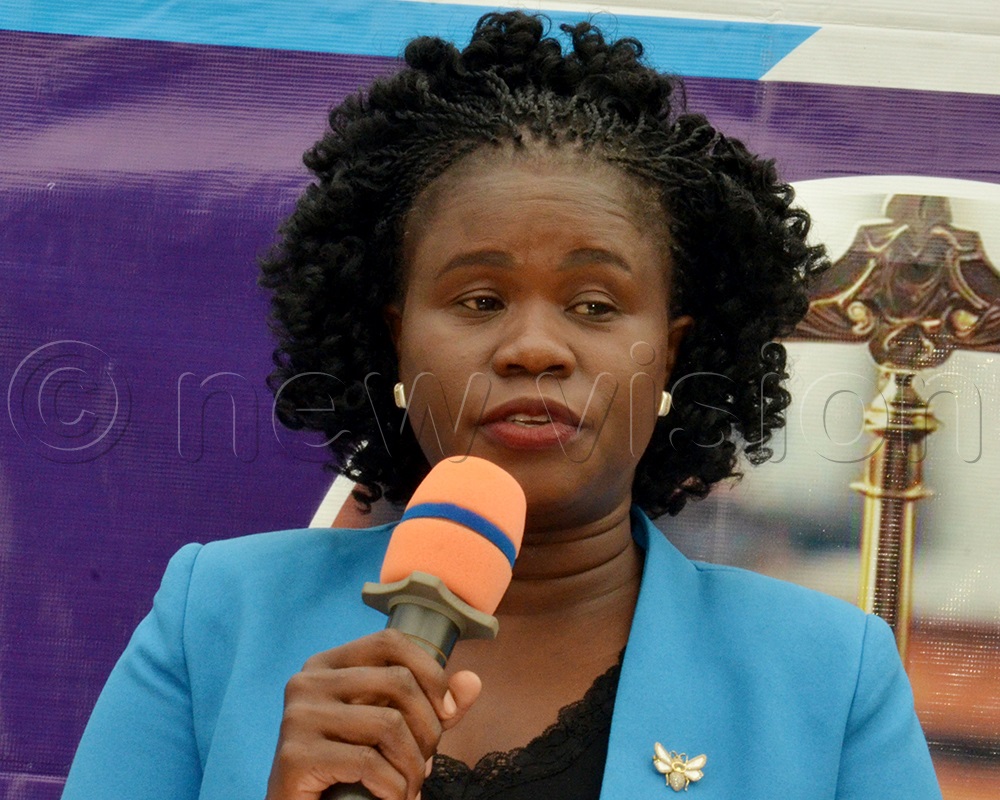Principal Judge urges Police to prioritize gender based violence cases
He said many of the GBV cases brought to court are not well investigated and lack evidence, which makes the perpetrators walk out freely because the evidence produced cannot allow them to be convicted.
Justice Dr Flavian Zeija speaking during launch of Justice For Her at Gulu High Court Circuit. (Photo by Jackson Kitara)
Jackson Kitara
Journalist @New Vision
________________
Principal Judge Dr Flavian Zeija, also the deputy chief justice designate, has urged criminal investigation Police officers to prioritise investigations into Gender Based Violence (GBV) cases.
He said many of the GBV cases brought to court are not well investigated and lack evidence, which makes the perpetrators walk out freely because the evidence produced cannot allow them to be convicted.
“Many GBV perpetrators walk freely because the investigation by police is not enough to convict them. Court convictions are based on evidence; we allow the perpetrators to go free, but deep in our hearts, we know the suspect has committed the offence,” Zeija said

Principal Judge Justice Dr Flavian Zeija apending his signature after launching the project at Gulu high court circuit. (Photo by Jackson Kitara)
He expressed concern while launching the judiciary timeshare fast-track mechanism on GBV at the Gulu High Court circuit on March 20, 2025. The project code-named “Justice For Her” is a pilot project in Gulu High Court covering Nwoya and Amuru magistrates and Masaka High Court covering Sembabule, Rakai and Kalangala courts.
The three-year project supported by UN Women Uganda with funding from the Austrian Development Agency at a tune of $4.3 million (about sh15.7billion) aims at improving access to justice for survivors of GBV, particularly women and girls, by expediting the disposal of GBV cases and institutionalise daily GBV hearings to ensure timely and fair case disposal.
“The Police should do a thorough investigation, visit the scene of crimes and record witnesses with detailed information,” highlighted the Principal Judge, adding that they were going to train advocates, judges, magistrate, DPP, Police and prison officers on survivors centred approaches so that they develop their capacity.
He called upon all stakeholders to empower GBV survivors, not just with legal support but with confidence that their voices matter.
He said the project is an opportunity for the justice system to showcase how they can mainstream daily hearings of GBV cases. He also implored all actors involved to do it with utmost commitment, informed by the essence of justice.
Gulu High Court senior resident judge Philip Odoki also called upon investigators to emphasise proper investigation of GBV cases, citing that quite often, the GBV cases they receive, don’t touch on the key ingredients of the offence.

Justice Philip Odoki, senior resident judge, Gulu High Court peaking during the launch of project. (Photo by Jackson Kitara)
He also emphasised public sensitization so that survivors of GBV know where to report in time, what to do, how to preserve the scene of crime and how it can be prevented at an early stage.
Odoki noted that the project has come at the right time and will give hope to victims, survivors and also accused persons that justice will prevail in a short time.
He also noted that they have failed to provide speedy and fair hearings of GBV cases as commanded in Article 28 of the Constitution of Uganda and delay justice as commanded in Article 128 of the Constitution of Uganda due to an overwhelming case backlog.
At the Gulu High Court, Odoki said GBV cases stand at 53% of the total criminal cases. “At the moment, we have 1,876 cases of which 876 are backlog, 433 criminal cases and 230 GBV cases.
“For this project to be successful, stakeholders who are key implementers must have requisite commitment and dedication to make it work,” he said.
Adekemi Ndieli, the deputy country representative of UN Women said they are committed to ending all forms of violence against women and girls and see that they have access to justice, timely and effective.

Adekemi Ndieli, the deputy country representative UN women apending her signature after launching the project at Gulu high court circuit.(Photo by Jackson Kitara)
“Access to justice is an essential ingredient of an effective accountable and gender-responsive justice delivering system for realization of women and girls’ rights. GBV not only violates human rights but also affects the nation's socio-economic development capacity”, Ndieli said.
Ndieli said physical violence against women and girls is very high at 61% which is above the African average of 37.7% while sexual violence remains a critical issue, 17% of women from the age of 15-49 have experienced sexual violence from 12 months and in every three women, two must have experienced.
She said despite lengthy procedures, there is still a systemic gap in the justice system in Uganda, as well as weak enforcement that discourages women from reporting, including low processes.
“Ending violence against women and girls requires collective action of government, CSOs, private sectors, community actors, and law enforcement agencies to unite to challenge harmful traditional and gender-based norms that discriminate against women. We must strengthen legal protection, and ensure that survivors receive the support they require,” she remarked.
Pamela Lamunu Ocaya, the acting chief registrar said the project is a timely and much-needed intervention that will help to enhance the capacity of judiciary to handle GBV cases.

Pamela Lamunu Ocaya, the acting chief registrar speaking during the launch of project. (Photo by Jackson Kitara)
She urged those trained to put into practice what they have learnt so that they administer justice without delay.
“This project requires concerted efforts of each one of us for its successful implementation. GBV cases account for a considerate amount of caseload in our courts, I thank UN Women for the partnership to deliver fast tract for management of GBV cases,” Lamunu said.